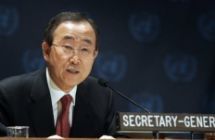Sudan response pending on troop donors and land for Darfur force: UN Chief
October 10, 2007 (UNITED NATIONS) — The UN Secretary General Ban Ki-Moon said that the deployment of UN-AU hybrid force in Darfur will be delayed despite set deadlines by UN Security Council (UNSC).

UN Security Council resolution 1769 establishing UN-AU hybrid force provided for a transition from the African Union Mission in Sudan (AMIS) to the force known as UNAMID by December 31st.
However Ban Ki-Moon said that several obstacles stand in the way of a speedy deployment including the land needed for the construction of UNAMID headquarters in Darfur. The Sudanese government has yet to assign the land for the hybrid force.
The top UN official called on Sudan to “extend the support and cooperation necessary to resolve the issues”.
The other issue pending is Sudan’s approval on a list of troop donor countries for the Darfur force. The report acknowledged the commitment for a force with a “predominantly African character” but stressed the need for “a force which could effectively implement the mandate set out in resolution 1769”.
The AU and Sudan has objected to the presence of non-African troops saying that African continent has pledged enough forces. The AU Chairman Alpha Konare raised objections to some units, including those offered by Norway, Uruguay and Thailand without providing reasons.
This week UN officials said that they still lacked helicopters and ground transport vehicles that are crucial to the success of the force.
The U.N. Security Council authorized the joint peacekeeping force in July to protect civilians from fighting that has driven 2.5 million people from their homes over the last four years.
International experts estimate 200,000 people have died in the conflict, which Washington calls genocide, a term European governments are reluctant to use. The Sudan government says 9,000 people have been killed.
(ST)
